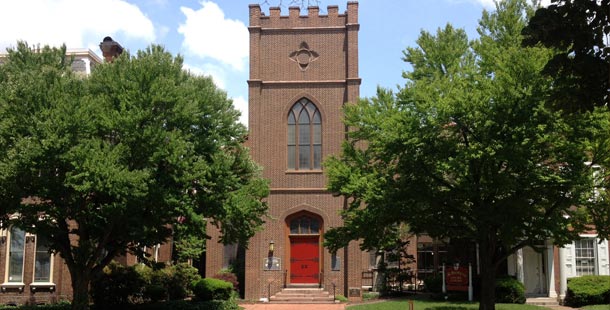The Diocese of Central Pennsylvania
We’re looking forward to working with you. This web page is offered to provide information on the day we will spend together. It also includes a few resources you may find useful as we prepare for April 26.
Date: Saturday April 26
Time: 9:00 am – 3:00 pm
 Saint Stephen’s Cathedral - 221 North Front Street – Harrisburg
Saint Stephen’s Cathedral - 221 North Front Street – Harrisburg
The follow up material from the group's work
Consultants and Facilitators for the Day: Bob Gallagher & Michelle Heyne
Our common task that day: Hear about the information from the listening process, reflect upon it, and explore what steps come next.
Background material: We assume you have received this material from Charlotte Weaver-Gelzer. If not, please contact her.
Our Process: Will include common prayer (Eucharist at 9:00 am and noon prayers before lunch), a couple of brief overall assessments, hearing the data gathered and reflection on what we have heard, group processes such as going around the circle to hear each person, small group discussion, testing the mind of the group, using a “fishbowl” process of committee heads and the Provisional Bishop, and so on.
Our role that day: Our primary role is to help you listen to and engage one another, as well as the information that has been gathered in the listening sessions.
We also bring broad experience in helping communities become healthier and more productive. Michelle has worked in the financial services industry for about 30 years and Bob has worked with organizations in the fields of domestic abuse, affordable housing, theater, legal services, public schools, and personal care products. Both have worked with many Episcopal parishes and several dioceses.
We do know quite a lot about parish revitalization. In fact we believe we know how a diocese can turn around a situation in which many parishes are in decline. But that is not what we are doing with you on April 26. If you are interested in our thinking on this please look around this web site, especially the blog or our books. We are in conversation with two southern dioceses about beginning Shaping the Parish programs with them in 2015. Each will probably allow some participants from outside the diocese.
We do not come with any specific answers for what should happen in the Diocese of Central Pennsylvania. You are the people who know the situation, and who will have to shape a future together and live with what you have created. Our task is to help you be in conversation with one another.
Norms for the Day
-We’d ask you to leave your cell phones and other communication devices both tucked away and off; please wait for the breaks to check and return messages.
-Help us make the process work. There are many ways to provide order to our work together. What we are offering is just one way. Please work with the process that is provided for the day and let’s not spend our time debating whether another way might be better. It may be both better and something to use at another gathering.
To the extent the group can practice a couple of core communication skills, it is more likely to experience the process as effective.
-Speak for yourself and create space for others to do the same. Identify your own needs, feelings, and concerns and be straightforward about them. Knowing where the people in the room actually stand builds trust and generates energy. Some phrases that may indicate you’re not speaking for yourself: “Most of us are really uncomfortable with X,” or “In this diocese we could never consider stopping Y.”
-Listen for understanding. Instead of automatically agreeing or disagreeing with another person’s comments, focus on whether you understand why they approach the issue that way or if there is any clarification that would be helpful to you. Curiosity is a useful stance in developing the ability to listen. Try to pay more attention to what’s being said in the moment and less attention to what you’re planning to say next. Consider allowing a bit of time and silence before responding.
Resources for Reflection
These are offered as resources for your own preparation for the day. They are for your reflection prior to the meeting. We may make use of some of these in the course of the day but that would be limited.
The Benedictine Promise
Stability – To find God in the current relationships and circumstances and of our life
Obedience – To find God in contemplative listening to others, self, creation, and God; to hear and respond
Conversion of Life – To find God in a new life; in the changing relationships and circumstances
The Benedictine Promise is a very useful model for considering the dynamics and life of a diocese, as well as the parish churches within the diocese. A PDF on the Benedictine Promise along with an assessment form
 Humility
Humility
hum·ble
1. not proud or arrogant; modest.
In an article describing the development of leadership humility through a Benedictine approach, Corné J. Bekker writes, “Of all the chapters and instructions [in the Rule of St. Benedict], no greater attention is given to any other virtue than humility. Humility is the road that leads to being formed into the image of God…and for Benedict the ultimate response to a righteous and loving God.”
Central to the development of humility is the cultivation of obedience – a word which many of us feel reactive to. It comes from the Latin oboedire, to obey, and shares its root with audire, “to hear.” Esther de Waal, in Seeking God: The Way of St. Benedict, writes, “…to obey really means to hear and then act upon what we have heard, or, in other words, to see that the listening achieves its aim. We are not being truly attentive unless we are prepared to act upon what we hear.” This sense of obedience – of recognizing that there are times we must submit to realities beyond our own needs or sensibilities – is interwoven with humility.
In the Episcopal Church, obedience is often understood as the cultivation of deep, mutual listening within our communities. Our approach to communal decision-making assumes we are steeped in common prayer and that we participate with a humble, receptive stance. A stance that seeks first to listen, then to understand, and then to act.
Diocesan Life Cycle
Like all organizations, dioceses have a life cycle. Dioceses will naturally become static and enter into decline without effective ways of returning to the issues of formation – direction, culture, levels of competence and commitment, and an adequate alignment among elements (vision, program, resources, culture). It becomes more and more difficult to reverse a declining situation as a diocese moves from simply being “static” to actual decline to disintegration. Here’s a PDF on the diocesan life cycle.
Blog posting related to life cycles in parishes.
The Three Primary Tasks of a Diocese
There are three areas that constitute the essential work of a bishop and a diocese.
1. The renewal and revitalization of parish churches.
The bishop needs to help all the parishes be communities that live and worship to the glory of God and in which the baptized are formed as instruments of God’s love in their lives in families, the workplace, with friends and in civic life. This includes seeing that all parishes have worship that sweeps people off their feet.
2. Engaging the region of the diocese
The diocese can work for justice and compassion, in that state or city, on its own, as well as in cooperation with parishes and in collaboration with other denominations,
3. Connecting the diocese with the larger church
The bishop is an essential connection with the national and international life of the Episcopal Church and the Anglican Communion. The bishop also has a responsibility to help parishes be grounded in the Anglican ethos.
There are also all sorts of odds and ends a bishop may need to deal with but these three things are the core. And the renewal and revitalization of parish churches is the primary task. If a bishop does the other two things and fails at this—that bishop has failed.
Blog posting on the Role of the Bishop and the Diocese.
The Three Primary Tasks of a Diocese – with an assessment worksheet
The Need for Critical Mass
Any system needs enough people at its emotional and functional center - a critical mass - to create the energy, focus, and output to accomplish the work of that organization. For a diocese and for parish churches, there needs to be a critical mass of people who possess the spiritual maturity, emotional intelligence, and leadership ability to advance the aims of the church.
In some dioceses, there are many individuals with these qualities but the system itself fails to achieve critical mass. This can occur because individuals operating in isolation, no matter how skilled, will not have much impact on the system overall – particularly as the system gets larger, more complex, and more dispersed. There must also be adequate connection or “glue” among people. There must be opportunities for productive conversation, and development of shared understanding of purpose to set loose the dynamics that allow the system to leverage the gifts of individuals.
A PDF on Developing Critical Mass in the Diocese
Appreciative stance
Our assumption is that for any diocese to improve its life there is a need to:
- Identify and appreciate the existing gifts and strengths of the diocese
- Build upon those gifts and strengths – do more of what’s working well and keep working to do them even better
- Be aware of, and effectively manage, the diocese’s blindside, its weaknesses, and the ways in which it habitually undermines itself. Effective management is reality-based and involves consciously compensating for weakness and using structured improvement processes, rather than trying to eliminate the weakness by exhortation, force of will, or otherwise imagining you’re something you’re not.
Transition Dynamics
As one bishop leaves and a new bishop is selected, predictable dynamics emerge in any diocese as the system addresses the inevitable changes that emerge. The ways of working that had been created will change. The nature of relationships will change. Leaders in the diocese will begin to experience concerns and hopes about the basic ways of working that have been in place and about their place in the organization. New choices will present themselves.
Here is a document that describes some common dynamics Understanding the ways systems typically respond to these dynamics helps a diocese better understand the options available to them and can assist with productively managing the anxiety that naturally accompanies significant change.